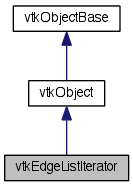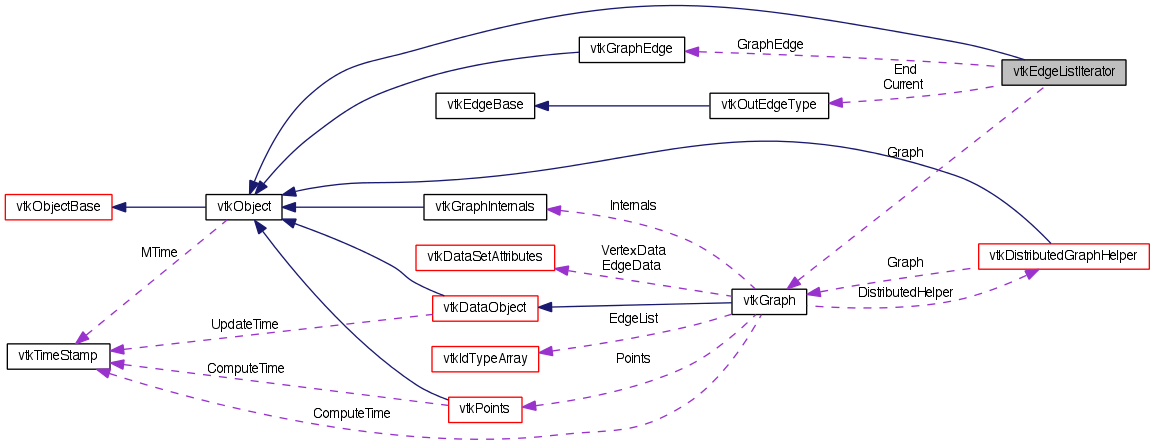Iterates through all edges in a graph. More...
#include <vtkEdgeListIterator.h>


Public Types | |
| typedef vtkObject | Superclass |
Public Member Functions | |
| virtual int | IsA (const char *type) |
| vtkEdgeListIterator * | NewInstance () const |
| void | PrintSelf (ostream &os, vtkIndent indent) |
| virtual vtkGraph * | GetGraph () |
| virtual void | SetGraph (vtkGraph *graph) |
| vtkGraphEdge * | NextGraphEdge () |
| bool | HasNext () |
| vtkEdgeType | Next () |
Static Public Member Functions | |
| static vtkEdgeListIterator * | New () |
| static int | IsTypeOf (const char *type) |
| static vtkEdgeListIterator * | SafeDownCast (vtkObjectBase *o) |
Protected Member Functions | |
| virtual vtkObjectBase * | NewInstanceInternal () const |
| vtkEdgeListIterator () | |
| ~vtkEdgeListIterator () | |
| void | Increment () |
Protected Attributes | |
| vtkGraph * | Graph |
| const vtkOutEdgeType * | Current |
| const vtkOutEdgeType * | End |
| vtkIdType | Vertex |
| bool | Directed |
| vtkGraphEdge * | GraphEdge |
Detailed Description
Iterates through all edges in a graph.
vtkEdgeListIterator iterates through all the edges in a graph, by traversing the adjacency list for each vertex. You may instantiate this class directly and call SetGraph() to traverse a certain graph. You may also call the graph's GetEdges() method to set up the iterator for a certain graph.
Note that this class does NOT guarantee that the edges will be processed in order of their ids (i.e. it will not necessarily return edge 0, then edge 1, etc.).
- See also:
- vtkGraph
- Examples:
- vtkEdgeListIterator (Examples)
Definition at line 55 of file vtkEdgeListIterator.h.
Member Typedef Documentation
Reimplemented from vtkObject.
Definition at line 59 of file vtkEdgeListIterator.h.
Constructor & Destructor Documentation
| vtkEdgeListIterator::vtkEdgeListIterator | ( | ) | [protected] |
| vtkEdgeListIterator::~vtkEdgeListIterator | ( | ) | [protected] |
Member Function Documentation
| static vtkEdgeListIterator* vtkEdgeListIterator::New | ( | ) | [static] |
Create an object with Debug turned off, modified time initialized to zero, and reference counting on.
Reimplemented from vtkObject.
| static int vtkEdgeListIterator::IsTypeOf | ( | const char * | name | ) | [static] |
Return 1 if this class type is the same type of (or a subclass of) the named class. Returns 0 otherwise. This method works in combination with vtkTypeMacro found in vtkSetGet.h.
Reimplemented from vtkObject.
| virtual int vtkEdgeListIterator::IsA | ( | const char * | name | ) | [virtual] |
Return 1 if this class is the same type of (or a subclass of) the named class. Returns 0 otherwise. This method works in combination with vtkTypeMacro found in vtkSetGet.h.
Reimplemented from vtkObject.
| static vtkEdgeListIterator* vtkEdgeListIterator::SafeDownCast | ( | vtkObjectBase * | o | ) | [static] |
Reimplemented from vtkObject.
| virtual vtkObjectBase* vtkEdgeListIterator::NewInstanceInternal | ( | ) | const [protected, virtual] |
Reimplemented from vtkObject.
Reimplemented from vtkObject.
| void vtkEdgeListIterator::PrintSelf | ( | ostream & | os, |
| vtkIndent | indent | ||
| ) | [virtual] |
| virtual vtkGraph* vtkEdgeListIterator::GetGraph | ( | ) | [virtual] |
| virtual void vtkEdgeListIterator::SetGraph | ( | vtkGraph * | graph | ) | [virtual] |
Returns the next edge in the graph.
Just like Next(), but returns heavy-weight vtkGraphEdge object instead of the vtkEdgeType struct, for use with wrappers. The graph edge is owned by this iterator, and changes after each call to NextGraphEdge().
| bool vtkEdgeListIterator::HasNext | ( | ) |
Whether this iterator has more edges.
| void vtkEdgeListIterator::Increment | ( | ) | [protected] |
Member Data Documentation
vtkGraph* vtkEdgeListIterator::Graph [protected] |
Definition at line 87 of file vtkEdgeListIterator.h.
const vtkOutEdgeType* vtkEdgeListIterator::Current [protected] |
Definition at line 88 of file vtkEdgeListIterator.h.
const vtkOutEdgeType* vtkEdgeListIterator::End [protected] |
Definition at line 89 of file vtkEdgeListIterator.h.
vtkIdType vtkEdgeListIterator::Vertex [protected] |
Definition at line 90 of file vtkEdgeListIterator.h.
bool vtkEdgeListIterator::Directed [protected] |
Definition at line 91 of file vtkEdgeListIterator.h.
vtkGraphEdge* vtkEdgeListIterator::GraphEdge [protected] |
Definition at line 92 of file vtkEdgeListIterator.h.
The documentation for this class was generated from the following file:
- /Users/kitware/Dashboards/MyTests/VTK_BLD_Release_docs/Utilities/Doxygen/dox/Common/DataModel/vtkEdgeListIterator.h
 1.8.0
1.8.0